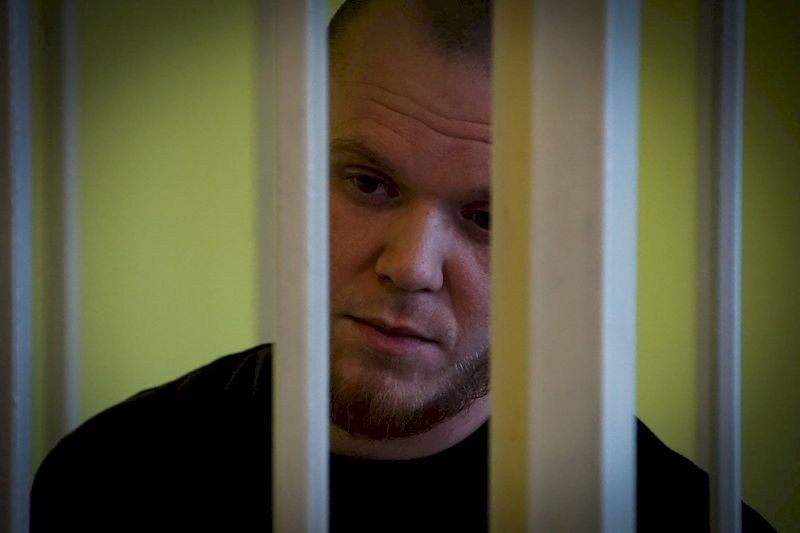• Topics / Human Rights Abuses in Russian-occupied Crimea
Ukrainian sentenced to 8 years on bizarre ‘sabotage’ charges in Russian-occupied Crimea

25-year-old Hennady Lymeshko has become the latest Ukrainian to receive a long sentence in Russian-occupied Crimea on highly implausible ‘sabotage’ charges. There was never any objective evidence to back the FSB’s claim on 15 August 2017 to have averted acts of sabotage, only a ‘confession’ from Lymeshko, who showed signs of having been beaten, The FSB appear to have maintained methods of pressure on Lymeshko who pleaded guilty during the hearing at the Sudak City Court on 10 May. It is very likely that he was deceived through promises that if he did not challenge the charges, he would receive a shorter sentence.
Instead, the de facto prosecutor demanded eight and a half years with the ‘judge’ only reducing this by six months. Journalist Anton Naumlyuk, who was in the court, reported that ‘judge’ Yevgeny Rykov considered the fact that Lymeshko has a young daughter to be an extenuating circumstance. The court, however, found there to be an aggravating factor in the alleged political motive of “hostility to the Russian Federation in connection with reunification (sic) of Crimea”.
The prosecution claimed that Lymeshko, who is from the Kharkiv oblast, had been recruited by Ukraine’s SBU [Security Service] and had been sent to Crimea on 9 August 2017 to carry out a number of acts of sabotage. He was supposed to have received a previously-prepared explosive device on 12 August and gone with it to block up an electricity line in Sudak. He was charged with preparing and storing explosives.
The FSB generally does everything in its power to ensure that prisoners are ‘persuaded’ to file a guilty plea, meaning that no proof need be provided. The ‘trial’ lasted all of an hour, and ‘judge’ Rykov spent only 20 minutes in the consulting chamber before issuing a ruling and providing all parties with certified copies, properly prepared in advance.
Lymeshko is planning to appeal.
The young Ukrainian’s arrest was exactly a year after the first in a number of seizures of Ukrainians on ‘sabotage’ charges. All of the cases have followed a pattern, with the first news of them, including for the men’s families, coming from televised ‘confessions’. In at least three of the cases – those of Redvan Suleymanov; Volodymyr Prysich and Oleksiy Stohniy – the men were eventually sentenced on charges that had little or nothing to do with their ‘confessions’, and three of the first four men arrested – Prysich; Yevhen Panov and Andriy Zakhtei – have said that they gave them under torture.
The FSB claimed on 15 August 2017 that Lymeshko had been arrested on August 12, after he arrived in Crimea on August 9. They asserted that through his arrest, they had “prevented several acts of sabotage against infrastructure and vital services in Crimea”
There were multiple question marks over the FSB’s claims. Even if Ukraine’s border guards had turned a blind eye to Lymeshko carrying explosives (as well as a very large handsaw!) into occupied Crimea, he also needed to pass through Russian border control. Yet three days later, the FSB allegedly found two trotyl [TNT] explosive devices on him, together with a mechanism for detonating them, flammable liquids; a digital camera (supposedly for the purpose of recording the sabotage in order to report back to his overseers.
In that statement, the FSB called Lymeshko “an agent of the SBU in the Kherson oblast, sent to Crimea to carry out acts of sabotage” and claimed that he had worked as a senior reconnaissance officer in the Ukrainian armed forces in the ATO zone (the fighting in Donbas).
Ukraine’s Armed Forces confirmed that Lymeshko was a contract serviceman from November 2016 through May 2017, but said that he had been dismissed as unsuited to the job, and that he had no ties to the military.
The FSB asserted that he was supposed to bring down the electricity supply from Sudak to Novyy Svet, with this affecting up to 50 thousand people, to set fire to forest in the Sudak – Rybachye – Alushta area and one other act of arson, and to cause a rock avalanche that would block the Sudak – Novyy Svet highway,
He was allegedly arrested while trying to damage the above-mentioned electricity lines with this handsaw.
All of this was broadcast on Russian television, together with Lymeshko’s confession, to having been in a sabotage group since the autumn of 2015.
A worryingly new element, which the FSB appeared to be coordinating with the Kremlin-backed militants of the so-called ‘Donetsk and Luhansk people’s republics’ [DPR, LPR] was that Lymeshko spoke of plans to carry out sabotage in ‘DPR’, Crimea and in Russia.
As mentioned, the ‘confession’ was anything but convincing, and not only because of the marks suggesting physical force had been applied. Lymeshko was clearly trying to provide answers required of him, and it was also obvious that the video was not continuous, but made up of separate parts pasted together.





